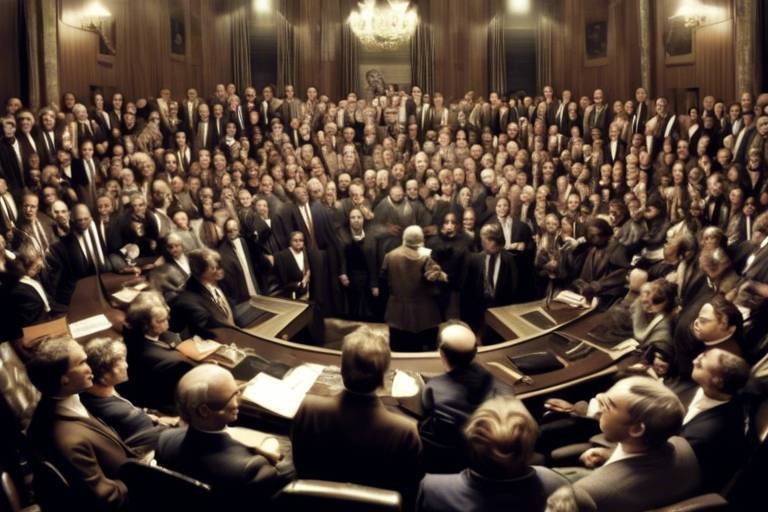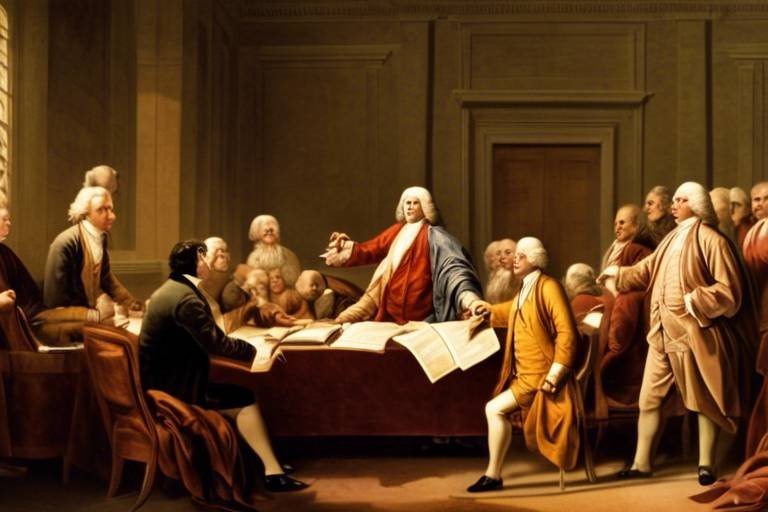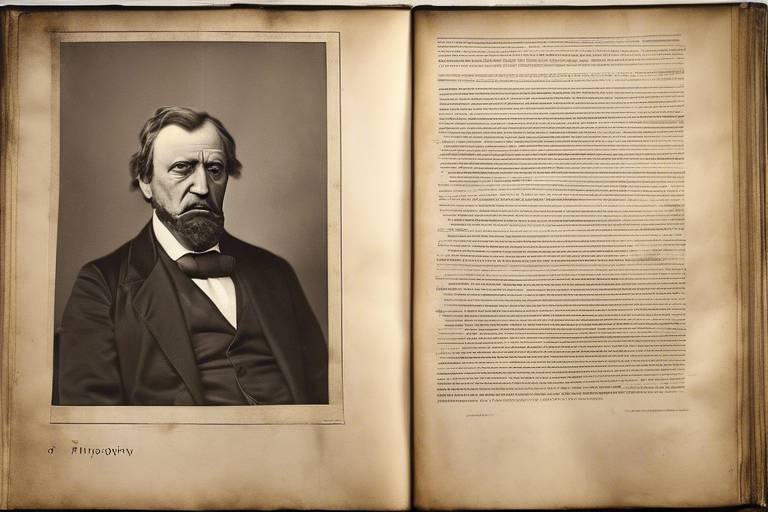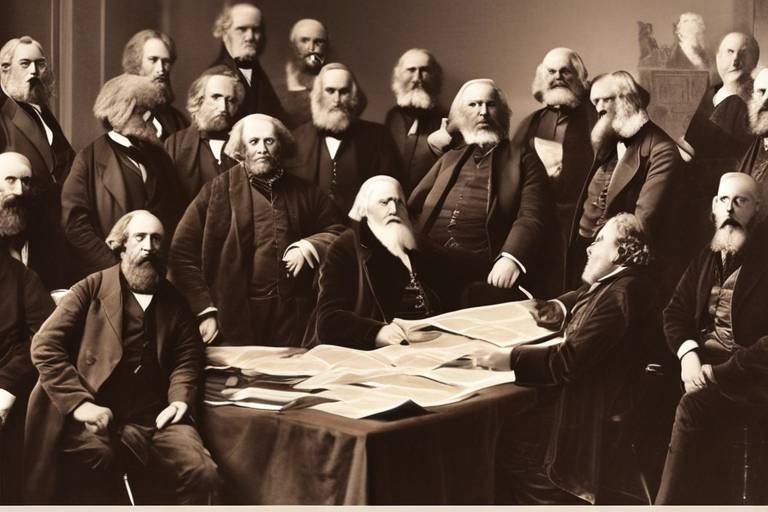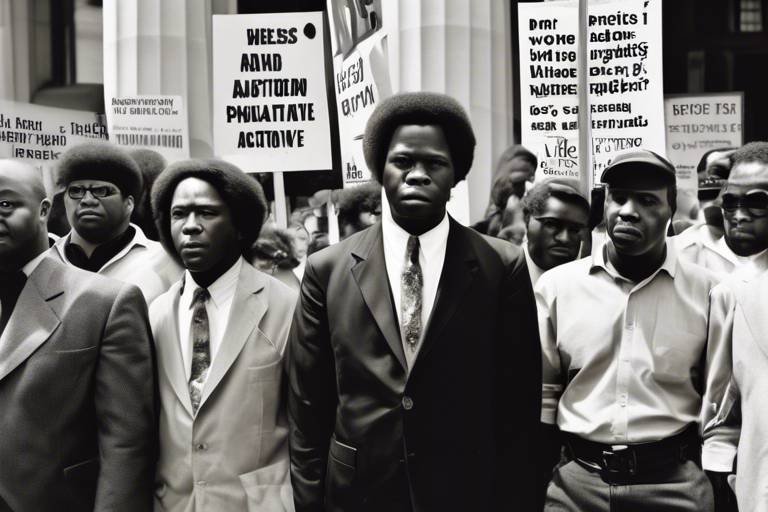Political Philosophy and Its Role in Economic Systems
In today's interconnected world, the relationship between political philosophy and economic systems is more crucial than ever. Political philosophy serves as the backbone for how societies organize themselves, influencing everything from governance to economic policies. Have you ever wondered how the ideologies that shape our political landscape also dictate the way economies function? This article dives deep into the intricate dance between political philosophies and economic frameworks, revealing how these concepts intertwine to shape our daily lives.
At its core, political philosophy probes the essential questions of governance, justice, and the role of the state. It provides a lens through which we can analyze the impacts of various ideologies on economic systems. Think of it as a map guiding us through the complex terrain of societal organization. Whether it's the advocacy for individual rights in liberalism or the push for collective ownership in socialism, each philosophy carves out a unique pathway that influences how resources are allocated, how wealth is distributed, and how markets are regulated.
Consider this: if political philosophy is the compass, then economic systems are the vehicles that navigate through the landscape of society. Each vehicle—be it a sleek liberal sports car or a sturdy socialist bus—operates under different principles and rules. The choices made under each philosophy not only affect economic outcomes but also shape the lives of individuals within those systems. The implications can be profound, affecting everything from job availability to social welfare. So, how do these philosophies play out in real-world scenarios? Let's explore the key political philosophies that have shaped economic management throughout history.
Political philosophy examines fundamental questions about governance, justice, and the role of the state, providing a framework to analyze how these concepts impact economic systems and societal organization. It's not just about who gets to make the rules; it's about understanding the *why* behind those rules. For instance, why do we prioritize individual freedoms in some societies while advocating for collective welfare in others? This exploration leads us to the heart of political ideologies, which ultimately influence economic structures.
Different political philosophies, including liberalism, socialism, and conservatism, offer distinct perspectives on economic management, property rights, and the role of government in regulating markets and wealth distribution. Each philosophy presents its own set of values and assumptions about human nature, society, and the economy, which in turn shape the policies that govern economic activity.
Liberalism emphasizes individual rights and economic freedom, advocating for minimal government intervention in markets. This philosophy posits that when individuals are free to pursue their own economic interests, innovation flourishes, competition increases, and overall economic growth is achieved. It's like a garden where each plant, representing individual entrepreneurs, grows best when given space and sunlight—free from the shadows of excessive regulation.
In a liberal economic system, market dynamics are driven by supply and demand, allowing for self-regulating mechanisms that can foster efficiency and consumer choice. Think of it as an invisible hand guiding resources to where they are most needed. However, just as a garden requires some care and attention, so too does a liberal economy need a framework to prevent chaos and ensure fair play.
Critics argue that unchecked liberalism can lead to inequality and social injustice. They highlight the potential for monopolies to form and for wealth to concentrate in the hands of a few, leaving vulnerable populations at risk. This begs the question: how do we strike a balance? Is some level of government intervention necessary to protect those who might otherwise be left behind in the race for economic success?
On the flip side, socialism prioritizes collective ownership and equitable distribution of resources. This philosophy aims to reduce economic disparities and promote social welfare through government intervention and planning. In a socialist framework, the government takes an active role in managing the economy, ensuring that resources are allocated in a way that benefits the entire community rather than just a select few. Imagine a potluck dinner where everyone brings a dish to share; the goal is to ensure that everyone leaves satisfied, rather than just a few individuals filling their plates to the brim.
The government plays a crucial role in shaping economic systems through regulation, taxation, and social policies, influenced by the underlying political philosophy guiding its actions. Whether through enforcing laws that protect consumers or implementing social safety nets, the government's choices reflect its philosophical stance on economic management.
Regulatory frameworks established by governments can significantly impact economic behavior. They determine the balance between free markets and necessary oversight to protect public interests. Consider how environmental regulations can affect business practices; they serve as a reminder that while economic growth is essential, it should not come at the expense of the planet.
Taxation policies are a reflection of political philosophies, with varying approaches to wealth redistribution that influence economic equality and the provision of public goods and services. For example, progressive taxation systems aim to ensure that those who earn more contribute a fair share back to society, while flat tax systems promote simplicity and equality in tax rates. The choices made in this arena can either bridge the gap between the rich and the poor or widen it, depending on the underlying philosophy guiding those decisions.
- What is political philosophy? Political philosophy is the study of fundamental questions regarding governance, justice, and the role of the state.
- How does political philosophy influence economic systems? Political philosophies shape the principles and policies that govern economic management, affecting everything from market regulation to wealth distribution.
- What are the main political philosophies? The main political philosophies include liberalism, socialism, and conservatism, each offering distinct perspectives on economic management.
- Why is government intervention necessary in some economic systems? Government intervention can help protect vulnerable populations, ensure fair competition, and address inequalities that may arise in a purely free market.

Understanding Political Philosophy
Political philosophy is like the compass guiding society through the often tumultuous waters of governance, justice, and the role of the state. It delves into fundamental questions about how we organize ourselves and the principles that govern our interactions. Have you ever wondered why some societies prioritize individual rights while others emphasize collective well-being? This is where political philosophy comes into play, offering a framework to analyze how these concepts shape our economic systems and societal organization.
At its core, political philosophy seeks to answer questions such as: What is justice? What is the ideal relationship between the individual and the state? How should resources be distributed in society? These inquiries are not just academic; they resonate deeply in our daily lives, influencing everything from the laws we follow to the economic structures we inhabit. For instance, the way a society views property rights—whether they are seen as sacred or subject to communal needs—can drastically alter its economic landscape.
Moreover, political philosophy is not a monolithic entity; it comprises various schools of thought, each offering distinct perspectives on how society should be organized. For example, liberalism champions individual freedom and minimal state intervention, while socialism advocates for collective ownership and equitable resource distribution. In this sense, understanding political philosophy is crucial for grasping the intricacies of economic management and how policies are formulated. It’s the lens through which we can evaluate the effectiveness and fairness of different economic systems.
As we navigate this complex terrain, it’s essential to recognize that political philosophies are not just theoretical concepts; they manifest in tangible policies and practices that affect our everyday lives. For instance, the debate over healthcare systems in various countries often reflects underlying political philosophies. Countries that lean towards liberalism may favor privatized healthcare, while those influenced by socialist ideals might advocate for universal healthcare systems. This interplay between political philosophy and economic systems is vital for understanding the broader implications of governance in our lives.
In summary, political philosophy provides the foundational ideas that shape our understanding of governance and economics. It’s a dynamic field that evolves with society, reflecting our changing values and priorities. By engaging with these philosophical questions, we can better comprehend the economic structures that govern our lives and the policies that emerge from them. So, the next time you hear a political debate or policy discussion, take a moment to consider the philosophical underpinnings at play. It might just change the way you view the world around you.
- What is political philosophy? Political philosophy examines fundamental questions about governance, justice, and the role of the state.
- Why is political philosophy important? It helps us understand how different political ideologies influence economic systems and societal organization.
- How do political philosophies affect economic policies? Different philosophies advocate for various approaches to issues like property rights, taxation, and government intervention.
- Can political philosophy change over time? Yes, political philosophies evolve with societal values and priorities, influencing policies and practices accordingly.

Key Political Philosophies
When we delve into the realm of political philosophies, we uncover a rich tapestry of ideas that shape our understanding of governance and economic systems. Each philosophy presents a unique lens through which we can view the relationship between the state and the economy. At the core of this exploration are three dominant philosophies: liberalism, socialism, and conservatism. Each of these ideologies not only influences how societies are structured but also dictates the policies that govern economic behavior.
To start with, liberalism is often celebrated for its emphasis on individual rights and economic freedom. Advocates of this philosophy argue that when individuals are free to pursue their own economic interests, innovation flourishes. Think of it like a garden where each flower (or individual) has the space to grow and thrive without interference. This leads to a vibrant ecosystem of competition, where businesses strive to improve and consumers benefit from a variety of choices. However, it’s essential to recognize that while liberalism promotes economic dynamism, it can also create significant challenges, such as rising inequality and social injustice.
Next, we have socialism, which takes a markedly different approach. At its heart, socialism seeks to address economic disparities by advocating for collective ownership and equitable distribution of resources. Imagine a community potluck where everyone contributes and shares the bounty—this is the essence of socialism. By prioritizing social welfare and government intervention, socialism aims to ensure that the needs of the many are met, rather than allowing wealth to accumulate in the hands of a few. This philosophy raises important questions about the balance between individual freedoms and collective responsibilities.
Lastly, conservatism offers a more traditional perspective, often valuing stability and continuity over radical change. Conservatives typically advocate for a limited role of government in the economy, emphasizing the importance of personal responsibility and the preservation of established institutions. This philosophy can be likened to a sturdy tree that has weathered many storms; it values the roots of tradition while cautiously embracing change. In terms of economic management, conservatives may support free-market principles but also recognize the need for some regulations to maintain order and protect property rights.
Understanding these key political philosophies is crucial as they lay the groundwork for the policies that govern economic systems. The interplay between these ideologies creates a dynamic landscape where ideas clash and evolve, ultimately influencing how resources are allocated and how economic justice is perceived. Whether through the lens of liberalism, socialism, or conservatism, each philosophy offers valuable insights into the ongoing dialogue about the role of government and the economy.
| Political Philosophy | Focus | Economic Implications |
|---|---|---|
| Liberalism | Individual rights, economic freedom | Minimal government intervention, innovation, competition |
| Socialism | Collective ownership, equity | Government intervention, wealth redistribution, social welfare |
| Conservatism | Tradition, stability | Limited government role, preservation of institutions |

Liberalism and Economic Freedom
Liberalism stands as a beacon of individual rights and economic freedom, advocating for minimal government intervention in markets. This philosophy is built on the belief that when individuals are free to pursue their own economic interests, it leads to innovation and competition, ultimately resulting in overall economic growth. Imagine a bustling marketplace where each vendor is free to sell their goods at their own prices; this is the essence of a liberal economic system. The idea is that when people are allowed to make choices, they will naturally gravitate towards what works best, much like how water flows to fill the lowest point in a landscape.
In a liberal economy, the dynamics of the market are primarily driven by the forces of supply and demand. This self-regulating mechanism fosters efficiency and provides consumers with a plethora of choices. For instance, consider a scenario where a new technology emerges. In a liberal framework, businesses are incentivized to adopt this technology to remain competitive, leading to rapid advancements and improved products for consumers. This cycle of innovation is what many proponents of liberalism cite as a major advantage of minimal government interference.
However, it’s essential to recognize that the concept of economic freedom is not without its challenges. Critics of liberalism often argue that an unchecked market can lead to significant inequalities and social injustices. For example, when markets operate without any oversight, there is a risk that wealth becomes concentrated in the hands of a few, leaving vulnerable populations at a disadvantage. This raises a crucial question: can we truly trust the market to regulate itself fairly? Many believe that some level of government intervention is necessary to protect these vulnerable groups and ensure a fair playing field. This intervention might include regulations to prevent monopolies, labor laws to protect workers, and social safety nets to support those in need.
In summary, while liberalism promotes a vision of economic freedom that encourages innovation and competition, it also invites scrutiny regarding the potential for inequality. The balance between allowing individuals the freedom to pursue their economic interests and ensuring that these pursuits do not harm the broader society is a delicate dance. As we navigate this landscape, it’s vital to consider how government policies can be designed to support both economic growth and social equity.

Market Dynamics in Liberalism
In the realm of liberalism, market dynamics are often viewed through the lens of individual freedom and the power of the free market. This philosophical approach asserts that when individuals are given the liberty to pursue their economic interests, the overall economy benefits. Imagine a bustling marketplace where vendors and consumers interact freely, negotiating prices and exchanging goods without excessive interference. This scenario epitomizes the liberal belief in self-regulating markets, where supply and demand dictate prices, fostering competition and innovation.
At the heart of this dynamic is the idea that competition drives efficiency. When multiple businesses vie for consumer attention, they are compelled to improve their products and services. This competition not only leads to better choices for consumers but also encourages technological advancements. For instance, think about how smartphone companies continuously innovate to capture market share. Each new feature or design emerges from a desire to outdo competitors, benefiting consumers with cutting-edge technology.
However, the liberal approach is not without its complexities. While the theory champions minimal government intervention, the reality often requires a delicate balance. In practice, the market can face challenges such as monopolies or externalities—situations where the actions of one party can negatively impact others. For example, a factory that pollutes a river may reduce costs for itself but harm the surrounding community. Thus, while the liberal market thrives on individual initiative, it also necessitates some form of oversight to ensure that the playing field remains fair and that public interests are safeguarded.
Moreover, the liberal framework promotes the idea of consumer sovereignty, where the preferences of consumers dictate the direction of the market. This concept suggests that businesses must be responsive to consumer demands, driving them to adapt and innovate continuously. If a particular product fails to meet consumer expectations, it risks being phased out in favor of alternatives that better satisfy market needs. This adaptability is a cornerstone of the liberal economic model, encouraging businesses to remain agile and customer-focused.
In summary, the market dynamics within a liberal economic system are characterized by a vibrant interplay of competition, consumer choice, and the necessity for regulatory measures to address market failures. While the ideals of liberalism advocate for minimal interference, the reality of economic interactions often reveals the need for a balanced approach. As we delve deeper into the complexities of economic systems, it becomes clear that understanding these dynamics is crucial for fostering an environment where both innovation and equity can flourish.
- What is the main principle of liberalism in economic terms? Liberalism emphasizes individual rights and economic freedom, advocating for minimal government intervention in markets.
- How does competition benefit consumers in a liberal market? Competition drives businesses to innovate and improve their offerings, resulting in better products and services for consumers.
- What are the potential downsides of a purely liberal economic system? Unchecked liberalism can lead to monopolies, inequality, and social injustices, necessitating some level of government intervention.
- How does consumer sovereignty function in a liberal economy? Consumer sovereignty means that consumer preferences drive market outcomes, encouraging businesses to adapt to meet these demands.

Critiques of Liberalism
Liberalism, while celebrated for its emphasis on individual rights and economic freedom, is not without its critics. Detractors argue that the unregulated pursuit of profit can lead to significant social disparities and economic injustices. Imagine a race where only a few runners have the best shoes and training, while others are left behind with no resources. This analogy perfectly illustrates how unchecked liberalism can create a scenario where wealth accumulates in the hands of a few, leaving the majority struggling to keep pace.
One of the primary critiques revolves around the concept of inequality. Critics contend that liberal economic policies often prioritize the interests of the wealthy, leading to a widening gap between the rich and the poor. This disparity can manifest in various forms, such as limited access to quality education, healthcare, and other essential services for the underprivileged. Without adequate government intervention, these inequalities can become entrenched, perpetuating cycles of poverty and limiting social mobility.
Moreover, opponents of liberalism argue that the focus on market efficiency often overlooks the social responsibilities of businesses. In a purely liberal framework, companies may prioritize profit over ethical considerations, leading to practices that exploit labor, harm the environment, or contribute to social unrest. For instance, consider a corporation that cuts corners on safety regulations to maximize profits. Such decisions can have devastating consequences for workers and communities alike, raising questions about the moral implications of prioritizing economic growth over human welfare.
Another significant critique is the argument that liberalism can lead to a lack of social cohesion. When individualism is placed above collective well-being, it can foster a sense of competition rather than cooperation among citizens. This can result in a fragmented society where people are more focused on their personal gains rather than the common good. Think of a neighborhood where everyone is looking out for their own interests; it becomes challenging to build a sense of community and mutual support, which are essential for a healthy society.
In response to these critiques, many advocates of liberalism acknowledge the need for a balanced approach. They argue that while economic freedom is crucial, it should be accompanied by regulations that ensure fair competition and protect vulnerable populations. This perspective suggests that a hybrid model, which incorporates elements of both liberalism and government intervention, may be the most effective way to address the shortcomings of a purely liberal economic system.
Ultimately, the critiques of liberalism highlight the ongoing debate about the role of government in economic management. While liberalism champions freedom and innovation, it also raises critical questions about the responsibility of society to ensure that all individuals have the opportunity to thrive. As we navigate the complexities of modern economies, finding a balance between freedom and equity remains a pressing challenge.
- What are the main critiques of liberalism? Critics argue that liberalism can lead to economic inequality, social fragmentation, and unethical business practices.
- How can liberalism be balanced with social responsibility? Many suggest a hybrid approach that incorporates government regulations to protect vulnerable populations while still promoting economic freedom.
- Why is individualism a concern in liberalism? A strong focus on individualism can undermine social cohesion and community support, leading to a fragmented society.

Socialism and Economic Equity
Socialism is often viewed as a counterbalance to the excesses of capitalism, placing a strong emphasis on economic equity and the collective ownership of resources. At its core, socialism advocates for a system where the means of production are owned and regulated by the community or the state, aiming to ensure that wealth and resources are distributed more evenly among the population. This philosophy challenges the notion that individuals should have unlimited rights to accumulate wealth, arguing instead that such practices can lead to significant disparities in living standards and opportunities.
In a socialist framework, the government plays a pivotal role in managing the economy, implementing policies that prioritize social welfare over profit. This often involves extensive government intervention in various sectors, including healthcare, education, and housing. By providing essential services and redistributing wealth through taxation, socialism seeks to create a safety net that protects the most vulnerable members of society. The idea is that by reducing economic disparities, everyone can enjoy a basic standard of living, fostering a sense of community and cooperation rather than competition.
Moreover, socialism promotes the concept of economic democracy. This means that not only should resources be shared, but also that citizens should have a say in how these resources are managed. This participatory approach can take many forms, from direct democratic processes to representative systems where elected officials advocate for the needs of their constituents. The underlying belief is that when people have a voice in economic decisions, they are more likely to support policies that promote equity and social justice.
However, socialism is not without its critiques. Detractors argue that it can stifle innovation and personal initiative, as the focus on equality can lead to a lack of motivation for individuals to excel beyond the average. Critics also point to historical examples where socialist policies have led to economic inefficiencies and bureaucratic overreach. In some cases, the promise of equity has resulted in a concentration of power within the government, undermining the very freedoms that socialism aims to protect.
To illustrate the differences in economic equity approaches, consider the following table that compares key aspects of socialism with capitalism:
| Aspect | Socialism | Capitalism |
|---|---|---|
| Ownership of Resources | Collective ownership | Private ownership |
| Wealth Distribution | Equitable distribution | Market-driven distribution |
| Government Role | Active intervention | Minimal intervention |
| Focus | Social welfare | Profit maximization |
In conclusion, socialism offers a compelling vision for achieving economic equity, emphasizing the importance of community and shared responsibility. While it presents a stark contrast to capitalist ideals, the ongoing debate about its efficacy highlights the complexities of managing an economy that serves all its citizens. As societies continue to grapple with issues of inequality, the principles of socialism may provide valuable insights into creating a more just and equitable world.
- What is socialism? - Socialism is an economic and political system where the means of production are owned collectively or by the state, aiming for equitable distribution of resources.
- How does socialism differ from capitalism? - Socialism focuses on collective ownership and wealth distribution, while capitalism emphasizes private ownership and profit maximization.
- Can socialism lead to economic growth? - While socialism prioritizes equity, critics argue it may limit individual motivation and innovation, potentially affecting economic growth.
- What are the main criticisms of socialism? - Critics claim socialism can result in inefficiencies, bureaucratic overreach, and a lack of personal initiative.

The Role of Government in Economic Systems
The government plays a crucial role in shaping economic systems, acting as both a referee and a participant in the market. This role is influenced heavily by the underlying political philosophy that guides its actions. For instance, in a liberal economic framework, the government is often seen as a facilitator of free markets, stepping in only when necessary to correct market failures or to ensure that competition remains fair. On the other hand, in a socialist context, the government is more directly involved in economic management, often controlling key industries and redistributing resources to promote equity and social welfare.
One of the primary functions of the government in any economic system is to establish a regulatory framework that can significantly impact economic behavior. Regulations can dictate how businesses operate, how resources are allocated, and how individuals engage in economic activities. This regulatory framework serves as a balance between allowing free market dynamics to flourish while also ensuring that public interests are protected. For example, environmental regulations can prevent businesses from harming ecosystems, while labor laws can protect workers' rights and ensure fair wages.
Taxation is another essential tool that governments use to influence economic systems. The structure of taxation reflects the political philosophy of a given society. In a more liberal economic system, tax policies may favor lower taxes and minimal intervention, encouraging individuals and businesses to invest and spend freely. In contrast, socialist systems may implement higher taxes on wealthier individuals and corporations to fund social programs and reduce economic disparities. The effectiveness of these taxation policies can be evaluated by looking at key indicators such as income inequality, access to public goods, and overall economic growth.
Moreover, government spending plays a pivotal role in shaping economic outcomes. Through fiscal policies, governments can stimulate the economy during downturns or invest in critical infrastructure projects that can lead to long-term economic benefits. For instance, during a recession, a government might increase spending on public works to create jobs and boost demand. This proactive approach can help mitigate the adverse effects of economic cycles and promote stability.
| Economic System | Government Role | Key Focus Areas |
|---|---|---|
| Liberalism | Minimal intervention | Market efficiency, individual freedoms |
| Socialism | Active management | Equity, social welfare |
| Conservatism | Moderate regulation | Tradition, stability |
Ultimately, the relationship between government and economic systems is complex and multifaceted. Each political philosophy offers a unique perspective on how best to manage the economy, influencing everything from regulatory practices to taxation policies. The effectiveness of these approaches can vary significantly based on the specific context and challenges faced by a society. As we navigate through the complexities of modern economies, understanding the role of government becomes essential in fostering economic growth while ensuring that the needs of all citizens are met.
- What is the primary role of government in economic systems?
The government regulates, taxes, and implements social policies that shape economic behavior and outcomes. - How do different political philosophies affect government roles?
Liberalism promotes minimal intervention, socialism advocates for active management, and conservatism seeks a balance between the two. - Why is taxation important in economic systems?
Taxation reflects the political philosophy of a society and is crucial for wealth redistribution and funding public goods.

Regulatory Frameworks
The concept of regulatory frameworks is pivotal in understanding how governments shape economic systems. These frameworks consist of rules, laws, and guidelines that dictate how businesses operate and how markets function. Think of them as the playing field for economic activities; without them, chaos would reign. Just like a referee in a sports game, regulatory bodies ensure that everyone plays by the same rules, promoting fairness and transparency.
Regulatory frameworks can vary widely depending on the political philosophy that underpins a government. For instance, in a liberal economic system, regulations might be minimal, allowing for greater market freedom and innovation. Conversely, in a socialist framework, regulations are typically more stringent, aimed at ensuring equitable resource distribution and protecting the interests of the collective. This divergence highlights how political philosophies directly influence the scope and nature of regulations.
Moreover, regulatory frameworks can be categorized into several key areas, including:
- Consumer Protection: Laws designed to safeguard consumers from unfair business practices.
- Environmental Regulations: Guidelines aimed at protecting the environment from harmful industrial practices.
- Labor Laws: Regulations that protect workers' rights and ensure fair wages and working conditions.
- Antitrust Laws: Rules that prevent monopolies and promote competition in the marketplace.
Each of these areas plays a crucial role in shaping economic behavior. For example, strong consumer protection laws can enhance trust in the marketplace, encouraging people to spend and invest. On the other hand, lax environmental regulations may lead to short-term economic gains but could result in long-term damage to the ecosystem, ultimately affecting future economic stability.
Additionally, the effectiveness of regulatory frameworks often hinges on their enforcement. A well-designed regulation is only as good as its implementation. Governments must ensure that they have the necessary resources and political will to enforce these regulations effectively. Without proper enforcement, even the best regulations can become mere words on paper, failing to achieve their intended outcomes.
In summary, regulatory frameworks are essential for balancing the interests of various stakeholders in the economy. They provide the structure within which economic activities occur, influenced by the underlying political philosophy. As we navigate through an increasingly complex economic landscape, the role of these frameworks will continue to evolve, responding to new challenges and opportunities that arise.
- What are regulatory frameworks?
Regulatory frameworks are sets of rules and guidelines that govern how businesses operate and how markets function, ensuring fairness and transparency. - How do political philosophies influence regulatory frameworks?
Different political philosophies prioritize various aspects of governance, leading to distinct regulatory approaches that reflect their values, such as individual freedom in liberalism or collective welfare in socialism. - Why is enforcement important in regulatory frameworks?
Effective enforcement ensures that regulations are not merely theoretical but are actively applied, helping to achieve their intended goals and maintain market integrity.

Taxation and Redistribution
Taxation is often viewed as a necessary evil, a way for governments to fund essential services and infrastructure. But it’s more than just a financial mechanism; it reflects the underlying political philosophy of a society. Different systems of taxation can either promote equity or exacerbate inequality, depending on how they are structured and implemented. For instance, progressive taxation, where higher income earners pay a larger percentage of their income in taxes, is often championed by socialists as a means to redistribute wealth and reduce economic disparities. This approach aims to create a more equitable society by ensuring that those who can afford to contribute more do so, thereby providing resources for public goods that benefit everyone, such as healthcare, education, and social services.
On the other hand, more conservative philosophies may advocate for flat or regressive tax systems, which can disproportionately burden lower-income individuals. In these systems, everyone pays the same rate regardless of income, which can lead to a widening gap between the rich and the poor. This raises the question: Is it fair for the wealthy to pay the same percentage as those struggling to make ends meet? The answer often depends on one’s political beliefs and values regarding economic justice.
The redistribution of wealth through taxation can be a contentious issue. Proponents argue that it is essential for creating a safety net that protects the most vulnerable members of society. For example, social welfare programs funded by taxes can provide crucial support for those facing unemployment, disability, or other hardships. Critics, however, may argue that excessive taxation stifles economic growth and innovation, as it takes money out of the hands of individuals and businesses who could otherwise invest it in new ventures.
To illustrate the impact of different taxation systems, consider the following table that compares progressive and regressive tax structures:
| Tax Structure | Characteristics | Impact on Wealth Distribution |
|---|---|---|
| Progressive Taxation | Higher tax rates for higher income brackets | Reduces income inequality, funds social programs |
| Regressive Taxation | Same tax rate for all, disproportionately affects lower incomes | Increases income inequality, limits social mobility |
Ultimately, the way a society approaches taxation and redistribution speaks volumes about its values and priorities. Are we a society that believes in lifting everyone up, or one that allows the wealthiest to thrive while the rest struggle? These questions are vital as we consider the future of economic systems and the role of government in shaping them.
- What is the purpose of taxation? Taxation is primarily used to fund government services and infrastructure, such as education, healthcare, and public safety.
- How does progressive taxation work? In a progressive tax system, individuals with higher incomes pay a larger percentage of their income compared to those with lower incomes.
- What are the criticisms of regressive taxation? Critics argue that regressive taxation disproportionately affects lower-income individuals, leading to increased economic inequality.
- Can taxation affect economic growth? Yes, taxation can influence economic behavior; high taxes may discourage investment, while lower taxes can stimulate growth.
Frequently Asked Questions
- What is political philosophy?
Political philosophy is the study of fundamental questions about governance, justice, and the role of the state. It helps us understand how these concepts shape economic systems and societal organization.
- How does liberalism influence economic systems?
Liberalism emphasizes individual rights and economic freedom, advocating for minimal government intervention in markets. This can lead to innovation and competition, ultimately driving economic growth.
- What are the critiques of liberalism?
Critics argue that unchecked liberalism can lead to inequality and social injustice. They highlight the necessity for some government intervention to protect vulnerable populations and ensure fair competition.
- What is the core principle of socialism?
Socialism prioritizes collective ownership and equitable resource distribution. It aims to reduce economic disparities and promote social welfare through government intervention and planning.
- What role does government play in economic systems?
The government shapes economic systems through regulation, taxation, and social policies, all influenced by the political philosophy guiding its actions. This role is crucial for balancing market freedom with public interest.
- How do regulatory frameworks affect the economy?
Regulatory frameworks established by governments significantly impact economic behavior. They determine the balance between free markets and necessary oversight to protect public interests.
- What is the significance of taxation in economic systems?
Taxation policies reflect political philosophies and play a vital role in wealth redistribution. They influence economic equality and the provision of public goods and services, shaping overall societal welfare.

